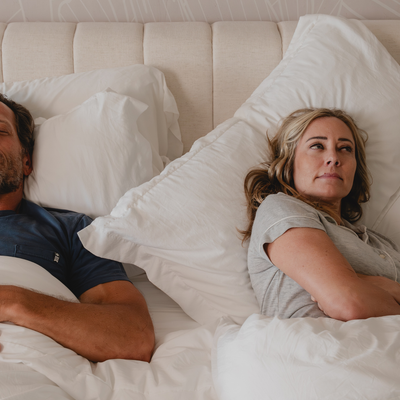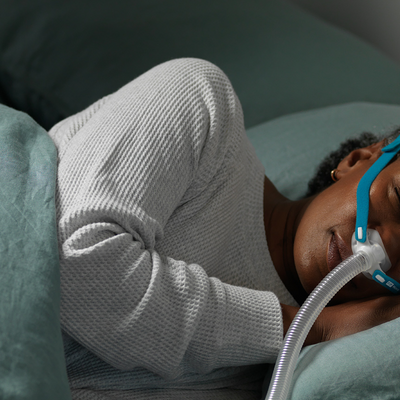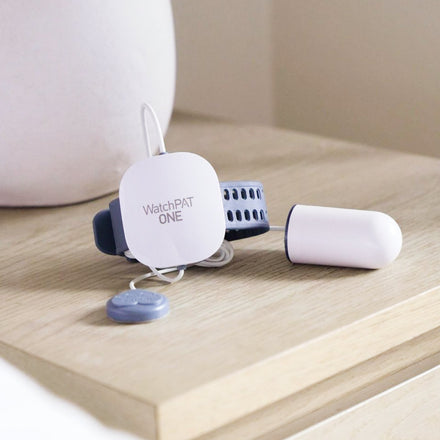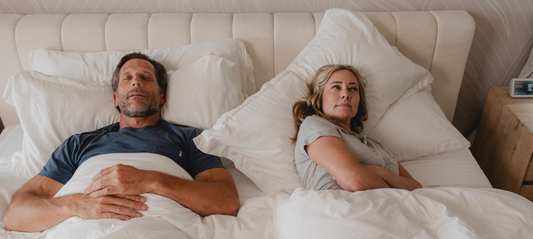As the light creeps into your bedroom, or the alarm signals the start of your day, what are the feelings triggered by a new morning? If you experience sleep apnea headaches, the onset of dull or throbbing pain is an unwelcome companion to your wake-up routine.
Does Sleep Apnea Cause Headaches?
While there is no conclusive evidence that identifies how or if Obstructive Sleep Apnea (OSA) directly causes headaches, OSA patients do experience a higher prevalence of morning headaches. A common explanation for morning headaches among people with OSA is that lapses in breathing, which are caused by sleep apnea, lead to sleep disturbances and lower blood oxygen levels during sleep. As a result, carbon dioxide builds up in the bloodstream, causing the brain’s blood vessels to dilate — and triggering the onset of a headache.
However, because low blood oxygen levels (known as hypoxemia) also occur among OSA patients who do not experience morning headaches, this explanation does not single out the cause for headaches.
What Does a Sleep Apnea Headache Feel Like?
Sleep apnea headaches have a distinct set of symptoms, though they share similarities with other types of headaches. Below, we’ve listed the headache subtypes that are most closely confused or associated with OSA.
Chronic Headache
Chronic headaches occur for 15 or more days in a month, for more than three months; and when they hit, they may last briefly or for four-plus hours. Many of the headache subtypes below (including sleep apnea headaches) can also be considered chronic headaches if they meet the criteria for frequency and duration.
Morning Headache
A morning headache is just as it sounds: a headache that you feel when you wake up in the morning. As you transition from a sleep to wakeful state, your brain becomes sensitive to changes in the environment, such as sound, light, and your body movement. These changes can trigger pain, particularly if they are associated with lack of sleep, dehydration, teeth grinding, alcohol use, migraines, sleep apnea, or other medical conditions.
Sleep Apnea Headache
A sleep apnea headache is a chronic morning headache that is experienced by people with OSA. Between 12 to 18% of people with OSA experience sleep apnea headaches, which typically …
- occur at least 15 days per month, though they can can occur daily
- last between 30 minutes and four hours
- do not typically come with other symptoms (nausea, light or sound sensitivity, etc.)
- vary in location and nature
More specifically, sleep apnea headaches may occur on one or both sides of the head, above the eyebrows, or they may shift in location. They may feel like a dull, sharp, throbbing, or pressing pain; they may also be nonspecific, so that you’re not sure where in your head you feel the pain.
Morning Headache Vs. Sleep Apnea Headache
A sleep apnea headache is a type of morning headache that is caused by OSA. Morning headaches are a symptom of sleep apnea, as they are significantly more common in patients with OSA. However, keep in mind that not all people with OSA experience chronic headaches when they wake up. Morning headaches have many potential causes, so people with and without OSA can experience them.
Hypnic Headaches
Hypnic headaches are rare headaches that occur during sleep. People with OSA can experience both sleep apnea headaches and hypnic headaches.
Unlike sleep apnea headaches, hypnic headaches do not occur after you wake up in the morning. Instead, they’re experienced about four to six hours after you fall asleep, and they may wake you up from sleep. They also exhibit additional symptoms, such as nausea or sensitivity to light and sound.
Cluster Headaches
Cluster headaches are also sleep-related headaches. They are the most severe headache subtype, and they can feel like intense burning or piercing pain near one eye. A person may also experience a runny or stuffy nose, sweating in the face, or droopy, teary, or reddening eyes. While people with cluster headaches do have a higher prevalence of OSA, the exact relationship between the two conditions is not established.
Like hypnic headaches, cluster headaches typically occur during sleep, last about an hour, and include additional symptoms. As the name implies, these headaches occur in “clusters” of time or amount. For example, you might experience a cluster headache at the same time of day, or a few times during the night, for weeks or months at a time. The headaches may disappear and then return for another cluster of time.
Migraines
Migraines are headaches that typically last longer than sleep apnea headaches (between four hours and three days) are felt on only one side of the head occur any time: night or day, while awake or during sleep include additional symptoms: nausea or vomiting, loss of appetite, stomach pain or discomfort, visual impairments, or sensitivity to light, sound, or smell feel like a throbbing, pounding, or pulsing sensation.
Like sleep apnea headaches, migraines can be chronic. Otherwise, the two headache subtypes are very distinct due to their contrasting symptoms and causes.
Are There Risk Factors for Sleep Apnea Headaches?
Just as breathing disruptions can lead to poor sleep and morning headaches, they can also contribute to long-term health issues. Therefore, risk factors for sleep apnea headaches are associated with the risk factors for sleep apnea, such as hypertension and cardiovascular disease.
Can You Get Diagnosed with Sleep Apnea Headaches?
People with OSA can be diagnosed with sleep apnea headache if they experience an apnea-hypopnea index (AHI) of five or higher during an overnight sleep test. Sleep apnea is identified as a pause or slowing of breath due to a partially or completely blocked airway. The apnea-hypopnea index therefore measures how often a person experiences pauses (apnea) or slowed (hypopnea) breathing during an hour of sleep.
The higher the AHI, the more severe the OSA. An AHI of 5 or higher signals at sleep apnea in a person; so if a person with OSA also experiences morning headaches, they could be diagnosed with sleep apnea headaches.
To diagnose OSA, a doctor will need to assess the results of a person’s overnight sleep test. If you suspect your morning headaches relate to undiagnosed OSA, take a home sleep test. Using a portable device, you can record and share one night’s at-sleep breathing patterns with a doctor, who will then provide a possible diagnosis of OSA, plus prescription and treatment options.
Treatment Options for Sleep Apnea Headaches
Sleep apnea headaches are treated with the same methods used to treat sleep apnea. Lifestyle changes, oral appliances, and surgery are common interventions, but the most effective long-term treatment for moderate to severe sleep apnea is CPAP therapy. Use of a CPAP device regulates the flow of air through your nose and/or throat so that your airway does not collapse or obstruct your breathing.
Patients who undergo CPAP treatment see significant improvement in the frequency and severity of morning headaches associated with sleep apnea. In one study, morning headaches from OSA were resolved in 90% of patients who underwent nasal CPAP therapy.
How to Get Rid of Sleep Apnea Headaches
Morning headaches can signal undiagnosed sleep apnea. If you regularly feel a headache when you wake up, consider other sleep apnea symptoms:
- Loud snoring and/or gasping or choking as you sleep
- Feeling drowsy and unrefreshed when you wake up
- Daytime sleepiness and fatigue
- Falling asleep during the day at work or even while driving
If you have any concern about OSA, start with a home sleep test from Lofta. You’ll receive a portable device that records your sleep data for one night, plus direct support from a doctor who assesses your sleep results. Then, if you’re diagnosed with sleep apnea, you’ll receive a prescription and treatment options that suit your needs and put a stop to your morning headaches.

















